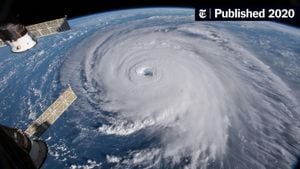Climate change has become increasingly visible through its impact on natural disasters, especially hurricanes. A recent study shows how human activities have turbocharged the maximum wind speeds of Atlantic hurricanes. This alarming trend has drawn attention to the connection between rising ocean temperatures and the intensified hurricanes we experience today.
According to research published by Climate Central, the human-driven rise of ocean temperatures has dramatically increased the maximum wind speeds of every Atlantic hurricane observed during 2024. The analysis highlighted the correlation between carbon dioxide emissions and warming sea surfaces, which has led to more powerful storms.
Specifically, the study found all eleven hurricanes tracked throughout the year exhibited wind speed intensification ranging from nine to twenty-eight miles per hour due to the historic warmth of the ocean. This significant rise not only affects the sheer force of the hurricanes but also correlates with the level of devastation they can inflict across communities.
For example, Helene, one of the most destructive hurricanes of 2024, exemplifies this trend. It transitioned from Category 3 to Category 4 as the result of climate change, with impacts compounding due to the additional warming of waters, which was observed to be about 2.5°F (approximately 1.4°C) hotter than what would be found in our pre-industrial era.
“Emissions from carbon dioxide and other greenhouse gases have influenced the temperatures of sea surfaces around the world,” noted Daniel Gilford, the lead author of the study. The connection between greenhouse gas emissions and storm intensity is particularly concerning because every increment of category increase—like moving from Category 4 to 5—can lead to approximately fourfold increases in the potential for destruction.
The Saffir-Simpson scale, which categorizes hurricanes based on wind speed and potential damage, shows the staggering difference between these categories. A minor Category 1 hurricane can cause approximately $18,000 worth of damage per mile; meanwhile, Category 5 storms can wreak havoc amounting to over $400 billion. With climate change causing increases not just in the frequency but also the intensity of hurricanes, concerns over public safety and economic strain on affected regions grow.
Between 2019 and 2023, studies focused on storm intensity similarly found human activity played a key role, with around 84% of hurricanes during this timeframe intensified by global warming. Notably, researchers pointed out specific storms where this upward trend was evident. For example, the hurricanes Oscar and Debby transitioned from tropical storms to hurricanes largely due to raised ocean temperatures fueled by climate change involvement.
During this past year alone, Category 5 storms such as Milton came to fruition as climate change augmented wind speeds by twenty-four miles per hour. Gilford added, "At the peak of its intensity before landfall, climate change made the warm sea surface temperatures 100 times more likely to occur than otherwise,” highlighting the role of climate change as not merely incidental but rather fundamental to the hurricanes’ evolution.
The influence of climate change on hurricane dynamics signals worrying trends for coastal communities. Rising water temperatures are not just fueling stronger storms; they are also contributing to prolonged and more intense rainfall accompanied by hurricanes, which can lead to significant flooding risks across many vulnerable areas.
Hurricane Helene has been noted to be particularly catastrophic, as its ramp-up to full hurricane status contributed to its high casualty rate—resulting in significant loss of life. The seven-fold increase from Category 3 to Category 4, which includes more than 200 fatalities, speaks to the terrible toll such storms can exact.
While the advancements made by climatologists help to understand the relationship between sea surface temperatures and hurricane intensity, these findings are unsettling. Friederike Otto, a climatologist with World Weather Attribution, emphasized the need to pay close attention to how these supercharged storms will affect us with the world only sitting at 1.3°C (2.3°F) above pre-industrial levels.
The gravity of this situation cannot be overstated. Otto warned, “While the hurricane scale is capped at Category 5, we might need to think about whether it will always be sufficient to classify these storms accurately—the reality is changing rapidly, and future storms could present risks greater than anything we’ve encountered so far.”
With weather models being pushed to the limit and climate projections continuously updated, it is clear the importance of addressing climate change through discussions and policy reform has never been greater. No single storm can solely highlight the overarching issues of climate-induced disasters, but data like this does provide concrete evidence of the changes we are facing and the urgency behind tackling climate change.
Enhanced monitoring and proactive measures are necessary to mitigate the impacts of these increasingly volatile storms. This means investing our time, resources, and focus on not just adapting to climate change but also working to combat it head on. The storms may be stronger, but our commitment must also be resolute.



